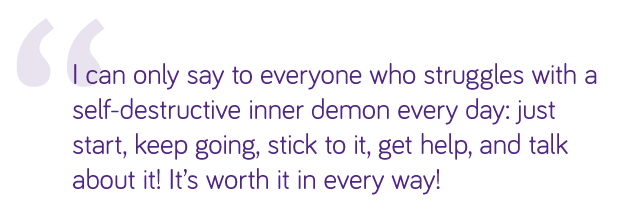
How it All Started
I’m Stephanie, 42 years old, and I have classic PKU that was managed early. My PKU childhood was uneventful. My phenylalanine (PHE) levels only increased when I was ill or when I secretly snacked on “no-go” foods. My mom was fantastic and taught me to pay constant attention to my food. To the point that even as a young child, I knew to refuse treats I wasn’t allowed to eat.
That being said, I probably didn’t have it as difficult as other PKU children (everyone’s tolerance is different) because mine was 800 mg phenylalanine (PHE) per day.
My Rebellious Teen Years
After years and years of managing my PKU successfully, my doctor told me that I could get a bit more relaxed with my diet. My teenage brain took this to mean I didn’t need to think about it as often and could get away with making rough estimations.
And so, my downward dietary spiral slowly began. I was a vegetarian at the time and started by “cheating” with the occasional dairy product. To top it off, I no longer took any PKU formula. I thought I was fine. I had nothing to worry about. My PHE levels remained within the recommended range for adults, even below 15 mg/dL PHE in the blood.
Everything seemed to be going well. I did my regular blood tests and went to the metabolic clinic once a year. I was okay with this way of eating. No nutritional deficiencies were found, and I had no difficulty concentrating or headaches.
Marriage and a Baby
I got married at the age of 23 and immediately knew that I wanted to have children. Which meant I had to get back on the PKU diet. Learn more about PKU and Pregnancy
I spent around eight weeks getting into the swing of things and had no issues with my low-protein diet and drinking my PKU formula. I was all in, knowing that I was doing it for my soon-to-be baby.
My daughter was born healthy in 2001. Straight after, I fell back into my old diet patterns when I was eating everyday foods that were as low in protein as possible – at least initially.
I Felt Like I Was Invincible!
As life got more hectic (raising a baby is a lot of work), I started making more exceptions, having more excuses to eat bits of meat, cheese-loaded pizzas, yogurt, and normal bread and pasta. Somehow, despite my cheating, I managed. My PHE-levels remained below 20mg/dL.
The Bad!
After a couple of months of eating (basically) whatever I wanted, I started getting tired. Not just “yawn tired”, I got “dead in my bones” tired, “feel like you’re melting” tired. I struggled to get out of bed and couldn’t complete the simplest tasks, even after having slept for 8 hours.
All I focused on was pushing through my half-day job for the sake of my family. By lunchtime, I got home and collapsed. I would sleep and sleep and still felt exhausted. By 5 pm, I needed ANOTHER nap.
Once we had dinner and relaxed by watching TV, I would pass out on the couch till bedtime. I would then fall into my bed and sleep through the night. My family used to tease me about it all the time which got me quite upset because a tired, drained mother and wife is not who I am.
I kept making excuses for my exhaustion, from blaming my work stress and household chores to putting my tiredness down to the pressures of raising a child. But even on holidays, when I had very few responsibilities, I just felt utterly broken.
So, I had my blood checked, and despite my exhaustion, all values were within normal limits. I got a measuring device to monitor my breathing and sleeping to see if it could be sleep apnea. People with sleep apnea stop breathing during intervals at night – so they don’t sleep properly and are tired all day – still nothing. My breathing was fine. I knew something was up.
At my next metabolic clinic appointment, I mentioned my fatigue, but was pretty ashamed so I underplayed the severity of it to my doctors They told me to keep an eye on it, not knowing how bad it had gotten. Deep down, I knew it had something to do with my protein intake.
That appointment was a bit of a wake-up call. I half-heartedly started paying more attention to the food I was eating, cutting out protein, and taking my PKU formula again.
I Realized; This is Madness
After struggling through my days, something switched in my brain. I realized what I was doing to myself was INSANE. I couldn’t carry on like this anymore. I attended a PKU information day at the Hannover Medical School, where I saw a film called “The Forgotten Children” that hit me right in my heart. Yes, when I was young and fit, I could mess around a bit – but I realized my excessive protein intake would profoundly affect my lifestyle and mental faculties as I got older. I was heading down a dangerous path, and I needed to make a change before it was too late.

My A-HA Moment
I started researching on the internet what was new on the market regarding PKU formula and low-protein foods. I ordered samples from various companies, tried everything, and finally informed the team at the metabolic clinic about my decision to go back on a “real” PKU diet. They gave me sensible and practical nutritional advice that helped me get back on top of my work, life, and energy again. I also received help and support from other PKUers and the Nutricia Metabolics community. I couldn’t have done it without them!
My Comeback-A New Attitude to Life
I had the will, and I learned the way, so I just started, and I succeeded! My goal was to get my PHE levels below 10 mg/dL. I achieved that and have been able to maintain it for two years now. What’s even better, my tiredness is gone! l’m awake and alert, I’m no longer mentally depressed, and I’m interested in hobbies and activities again. I have gained my quality of life back, which is all the motivation I need to keep going I never want to go back to being that miserable person again.
You Can Do It!
Getting back into a low-protein diet is easier than you think. Watch Renee’s Story to learn how he returned to diet as well. Do you need to make a comeback or know someone who does? The Nutricia Metabolics team is ready to support your return to a low-protein diet. Get started by visiting our Low-Pro Living blog for a variety of resources and tips.

The views/opinions presented are solely those of the individual and do not necessarily represent those of Nutricia. Always consult with your Metabolic Healthcare Professional before making any changes to your diet.
Brought to you by Nutricia North America. Copyright 2025 All rights reserved.
